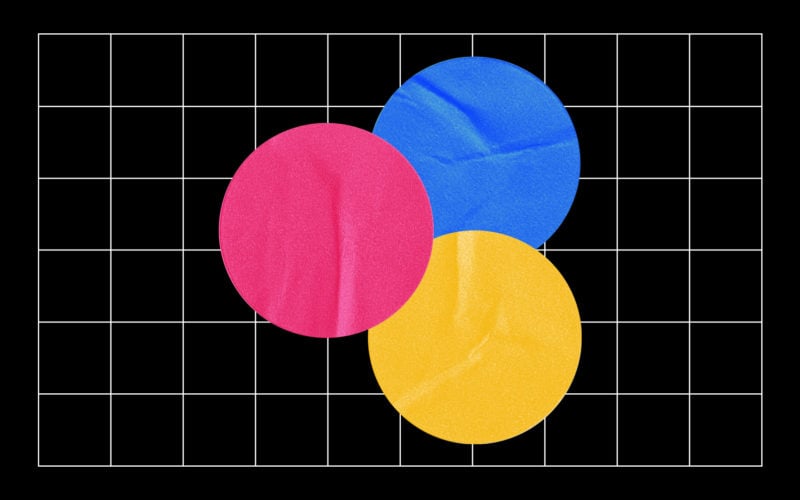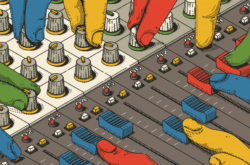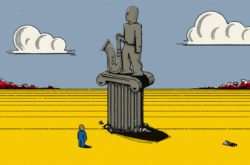Making music becomes more accessible by the day, but credible educational resources can still be hard to come by, whether in the form of traditional education or via the internet.
Splice hosted a panel earlier in February about music education and the obstacles that creators face in gaining knowledge of the music industry at large.
Our panelists consisted of Ivy Sole, Ayanna Depas, and Austin Marlow, each having come into the music industry from very different avenues. Ivy Sole is a singer and rapper from North Carolina whose debut studio album, Overgrown, navigates themes such as forgiveness, introspection, and purpose. Ayanna Depas is a GRAMMY-winning recording engineer who has worked with the likes of H.E.R., A$AP Ferg, and Mary J. Blige. Ayanna is also the founder of Clash of the Beatmakers, an annual beat battle in upstate New York. Austin Marlow is a prodigious drummer who tours with the legendary Philadelphia funk band, The Stylistics, and is one of the band leaders of Omar’s Hat.
Each of our panelists had very different relationships with learning their craft, and their diverse experiences led to an engaging and varied conversation on the topic. Read on for our full discussion.
Where did you all learn your musical craft?
Ivy Sole: I learned my craft formally and informally. I’m originally from Charlotte, North Carolina, where the Southern Baptist Church is still pretty much the forerunner in formal vocal training for most people. And then you can’t really learn how to rap formally. But when I was 16, a friend of mine pirated Fruity Loops — which I feel like is where most people started in hip hop — and began making beats. So I started making beats with them and then decided that although production is a lot of fun, I’d like to focus mostly on the language of the thing.
Ayanna Depas: I used to manage an artist. He was my cousin and we were in college at the time, so we didn’t really have access to recording studios or things like that. And when we did, the quality of our recordings were pretty poor. Eventually I was like, ‘You know what, I’m just going to go to school to learn how to do this.’ So I went to the Institute of Audio Research, and then after that I started doing internships.
Austin Marlow: Like Ivy, I grew up in church. My dad and my mom are singers, so it just pulled me in. I’ve been playing drums since I was two years old. Then, when I became five or six, my parents put me in different programs, and then I started playing for youth choirs around the city.
Where did you all learn about the music industry?
AM: The older I got, people started paying me and I figured that, well, this is a job. And then when I started playing with The Stylistics, that’s when I figured out that this is a business. I learned that I could get paid very well doing this – that I don’t have to have another job. The industry can also be dangerous. They’ll say they’ll pay you one thing, and then they don’t. So I got both sides of that.
IS: One distinct story that was consistently told to me throughout my adolescence and early college days was the story of Anita Baker and how she doesn’t own any of her music, and currently she doesn’t earn any royalties from it. So I think the DatPiff mixtape era, where people were just putting music on the internet, and these horror stories from the music industry combined to make me distrustful of the industry. So that kind of sparked my commitment to learning about the industry as a business, because if someone as prolific and legendary as Anita Baker is receiving $0 from her career, you need to be able to protect yourself from a dangerous industry, like Austin said.
What’s an experience that you’ve had in the industry that you’d like for someone to know about but not go through?
IS: I had a situation where someone used a topline that I wrote and didn’t give me credit and I had to reach out. If I hadn’t been diligent and tapped into what people were creating, that would’ve been lost money – and I’m fully independent, so every dollar counts. But also, you just want credit for your work. You don’t want to be in a situation where someone else can’t hire you based off of the work that you’ve done.
AD: Sometimes, especially the younger you are, there’s a lot of mental manipulation that happens. People make you feel like, ‘Oh, you’re not there yet,’ or ‘You’re not good enough.’ Don’t fall for it. If you weren’t good enough, you probably wouldn’t have been there. Don’t let anyone tear you down or make you feel like you can’t do it or that you’re inferior.
What are some of your favorite resources for music education?
AM: I always tell people to go out and play, and just research on your own. Listen to records – that’s your resource. Go out to places and just morph yourself into the music.
IS: Lynda.com taught me audio engineering. Also, just explore videos and the FAQ section of any website – those have become way more robust than they were in the past, when it was just a physical thing. They’re breathing, living documents now.
AD: If you’re into mixing, there’s Pensado’s Place. There’s also Mix with the Masters, which have different mixing engineers who pretty much break down a mix from start-to-finish, how they did it, and things like that. There are a lot of resources now if you want to learn the basics. I mean, sometimes you do come across bad information if you don’t know where to go, so I think the issue is knowing where to look and who to go to.
What were some other obstacles that you all had to overcome in your careers and music industry education?
AM: Growing up in the black church, nobody talks about reading music. Nobody talks about theory. I had a situation when I was 15 and I couldn’t read music. I was in a group of city kids who were doing a jazz recording, and the most embarrassing thing was when somebody said, “Okay, well since you can’t read it, someone else has to play it.” I had to go through that hurt and that pain to say, ‘All right, you know what? This will never happen to me ever again.’ And it hasn’t.
AD: One obstacle that I remember the most was in my last internship. There was a point where they were trying to hire assistant engineers for the studio, and I just knew I was a shoo-in because I had the most experience out of all the interns. They picked two people and it wasn’t me. I was cool because I wasn’t really there for the money. I just wanted to know more about recording, so I was fine with it as long as I got to work.
But it got to the point where those two didn’t cut it, so they had to bring someone from the outside. The person from the outside was one of my professors at my school and he was like, ‘Oh yeah, we’re taking over this place. Don’t worry, I got you.’ So he went in one day to learn the room and I was in my feelings because I felt like I deserved the assistant engineer position and I didn’t get the shot. And he was just like, ‘Stop being emotional and just get over here so I can show you everything!’ So I shadowed him that day and things started to make sense within that room.
I shadowed him for a year without getting paid, but I think it was three months in where I was able to do his job for him because he wasn’t able to come in all the time. For a year, the head engineers didn’t know it was me setting up these sessions and stuff like that. And then he was just like, ‘You know what? I think you got it.’ And then he left and the heads of the studio had no choice but to give me his job.
What are some of the most interesting things you’ve learned from collaborating with other musicians?
IS: Not every collaboration is going to work. I was a high-achieving youngster, so when things didn’t work, it made it feel like I wasn’t working hard enough. But sometimes things aren’t always going to work. I think that my entire life my parents were like, ‘If you put x amount of work in, you’re going to get y as a result.’ And you can literally get any letter in the alphabet. The other thing that I learned through collaboration is that I don’t actually like to collaborate with everyone. There are plenty of reasons why you can try to make music together, but sometimes those reasons are not enough. As of late, if I can’t say, “I love you,” to the person in some way, form, or fashion, nine times out of ten the music isn’t going to work.
AD: Because I work on the technical side, I don’t really get to choose who I work with. As an engineer, you have to learn to adapt to other people. So that’s a big part of our job too, besides the technical side. You have to learn how the artist or band works, and you have to pick it up fast.
What advice do you have for someone who might want to get into the music industry themselves?
IS: There are literally a million jobs in the music industry, and I think most people just think of artists, and that’s just inaccurate. There are corporate jobs in the music industry, and there are wonderful tech jobs in the industry. Even on the road, there are a million jobs; you can do lighting, live engineering, or play the actual music. You can manage, be an agent, be a booking person for a venue… So I would ask them what about the music industry they were interested in, and then try to like beg them not to be on the creative side because the creative side is the biggest headache.
AM: I’d just tell them that it’s not easy, and it won’t be easy. Even when you think you’re successful, you’re not. Your friends may think you’re successful. But something could happen where you won’t be able to be on that stage. What are you going to do then? So just be ready for anything, because it’s not easy.
AD: You’ve got to be strong mentally and spiritually. There will be moments where you probably feel like, ‘Oh I’m over this.’ I probably had one of those a couple of weeks ago. You just got to remember why you do it. Remember that you love it, and you can’t let anybody affect you so negatively that you’re like, ‘Oh well, you know, I guess I’m going to quit.’
This transcript has been edited and condensed for clarity.
February 26, 2020



